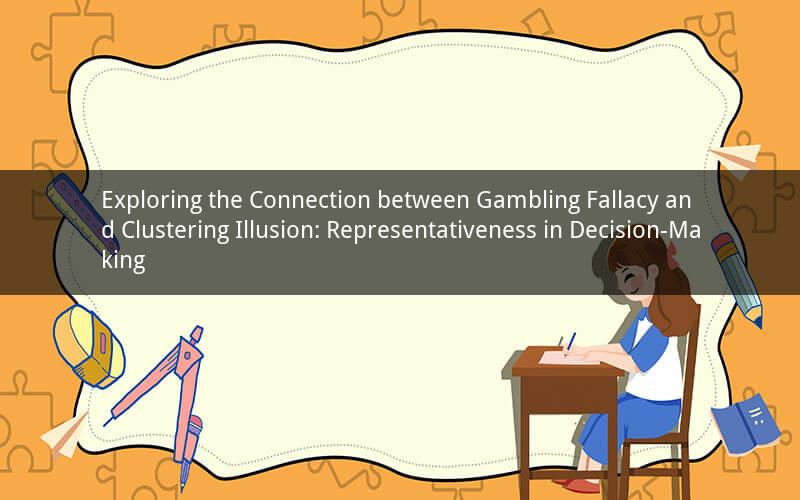
Gambling fallacy and clustering illusion are two common cognitive biases that influence individuals' decision-making processes. Both of these phenomena are rooted in the representativeness heuristic, which is a mental shortcut that people use to make quick judgments. In this article, we will delve into the relationship between gambling fallacy and clustering illusion, focusing on how they relate to the concept of representativeness.
1. Understanding Representativeness Heuristic
The representativeness heuristic is a mental shortcut that allows people to make quick judgments based on the perceived similarity between two objects or events. This heuristic is often used to evaluate the likelihood of an event occurring, such as whether a particular stock will rise or fall.
Representativeness is the degree to which an individual believes an event is similar to a prototype. For instance, if a person believes that a coin has a higher chance of landing on heads after a series of tails, they are applying the representativeness heuristic.
2. Gambling Fallacy
Gambling fallacy, also known as the Monte Carlo fallacy, is a cognitive bias that occurs when individuals believe that a random event is more likely to occur after a series of unlikely events have happened. This fallacy is often observed in gambling, where players believe that the outcome of a game is influenced by the outcomes of previous rounds.
The gambling fallacy is closely related to the representativeness heuristic because both phenomena involve the belief that certain patterns or sequences are indicative of future outcomes. For example, if a player sees a sequence of even numbers in roulette, they may believe that the next number is more likely to be odd, thus violating the principles of probability.
3. Clustering Illusion
Clustering illusion, also known as the pareidolia effect, is the tendency to perceive patterns or regularities in random or chaotic data. This illusion is often observed in various domains, such as stock market analysis, weather forecasting, and sports betting.
Similar to the gambling fallacy, clustering illusion is rooted in the representativeness heuristic. When individuals see a pattern or sequence in random data, they may believe that this pattern will continue in the future, thus making decisions based on false assumptions.
4. The Relationship between Gambling Fallacy and Clustering Illusion
Both gambling fallacy and clustering illusion are cognitive biases that result from the representativeness heuristic. While the gambling fallacy is specific to gambling scenarios, the clustering illusion can be observed in various contexts.
The relationship between these two phenomena lies in their shared reliance on the perception of patterns in random data. Both biases lead individuals to believe that their decisions are based on reliable information, when, in reality, they are merely following their intuitive judgments.
5. The Impact of Representativeness on Decision-Making
The representativeness heuristic can have a significant impact on decision-making, especially in situations where individuals must rely on limited information. By focusing on the perceived similarity between objects or events, individuals may overlook the role of probability and other relevant factors.
The following examples illustrate the impact of representativeness on decision-making:
- Investors who believe that a particular stock will rise because of a recent trend may overlook the possibility of market corrections.
- Sports bettors who notice a pattern in the outcomes of a particular team may bet heavily on that team, even though the pattern is not indicative of future results.
- Consumers who believe that a product with a high number of positive reviews is guaranteed to be of high quality may be influenced by representativeness, rather than actual product performance.
In conclusion, the representativeness heuristic plays a crucial role in gambling fallacy and clustering illusion. Both of these cognitive biases result from the belief that certain patterns or sequences are indicative of future outcomes, even though this belief is not supported by probability theory.
Questions and Answers:
1. How does the representativeness heuristic contribute to the gambling fallacy?
The representativeness heuristic contributes to the gambling fallacy by causing individuals to believe that patterns or sequences observed in random events are indicative of future outcomes, leading them to make decisions based on false assumptions.
2. Can the clustering illusion be observed in everyday life?
Yes, the clustering illusion can be observed in various everyday situations, such as people believing that certain numbers are "lucky" or "unlucky," or that certain events are more likely to occur based on previous experiences.
3. What are the potential consequences of relying on representativeness in decision-making?
Relying on representativeness in decision-making can lead to biased conclusions, missed opportunities, and poor choices. This can be particularly detrimental in high-stakes scenarios, such as investments, sports betting, or job hiring.
4. How can individuals overcome the representativeness heuristic?
Individuals can overcome the representativeness heuristic by focusing on the principles of probability and statistics, seeking out objective information, and being aware of their cognitive biases.
5. Are gambling fallacy and clustering illusion exclusive to gambling and random data?
While gambling fallacy and clustering illusion are most commonly observed in gambling and random data, they can also be found in other contexts where individuals rely on intuitive judgments and perceive patterns in information.